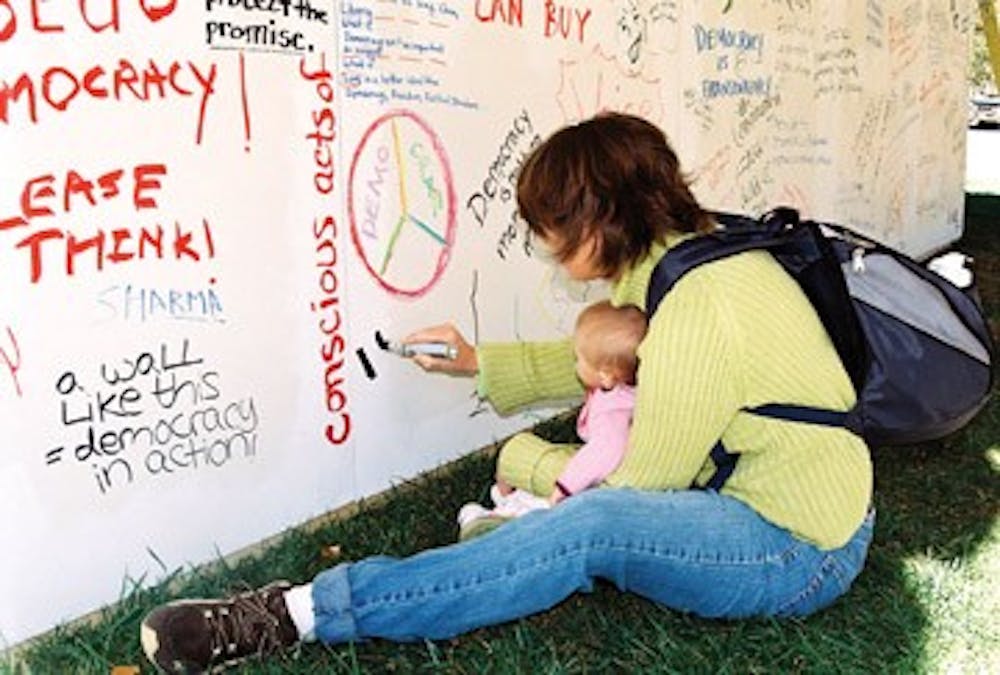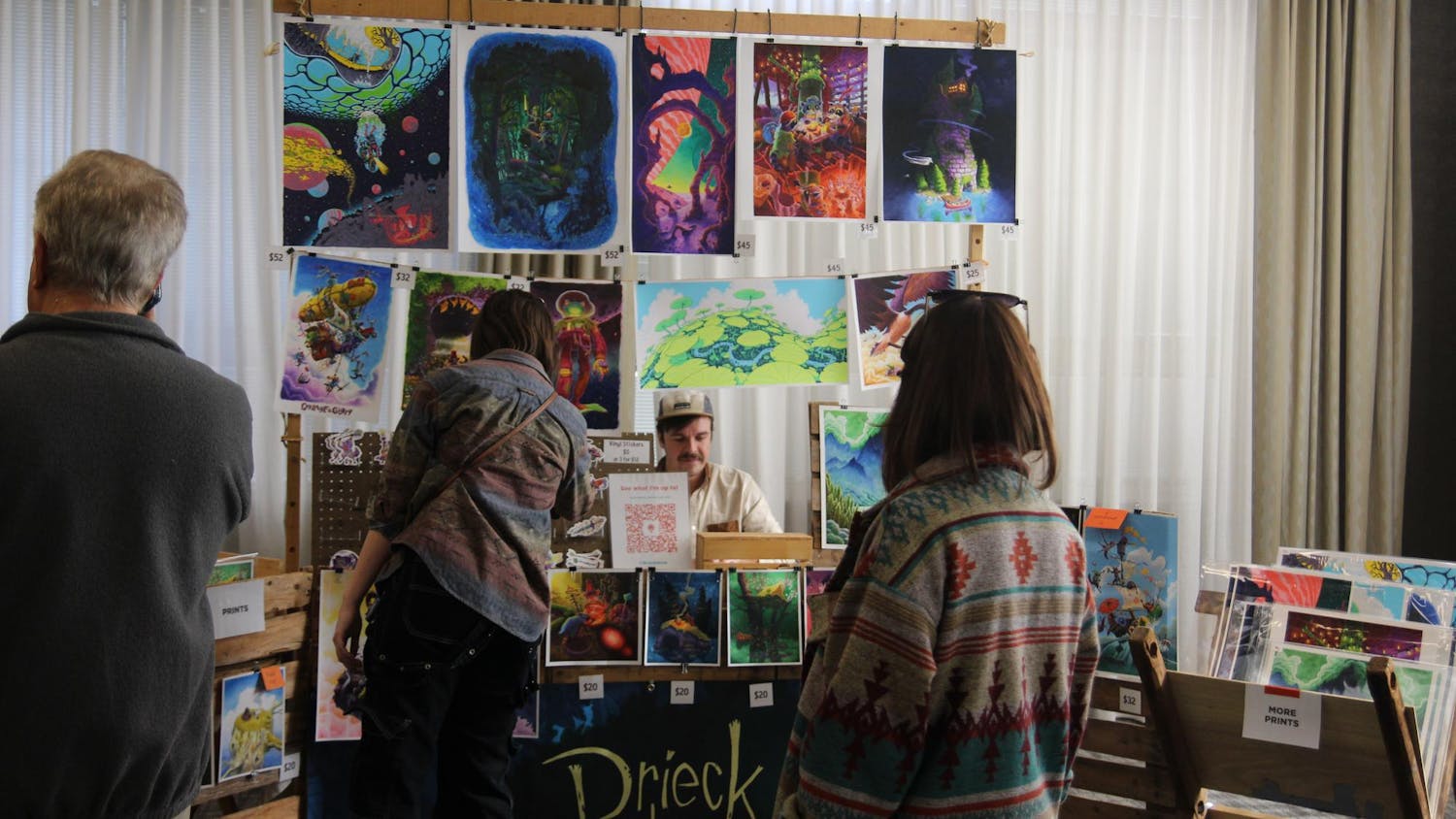During the 12 days of the 24th annual ArtsWeek, a Bloomington winter arts festival, a motley crew of visual artists, musicians, photographers, dancers, journalists, lawyers and academics will explore this year’s theme, “Politics and the Arts,” said Sherry Knighton-Schwandt, coordinator of ArtsWeek.\n“The theme of ArtsWeek has a lot to do with the fact that in 2008, we’ll be experiencing an election,” Knighton-Schwandt said. “We thought it would be a good idea to focus on what this means to artists and everyone else.”\nThis year’s ArtsWeek, with events scattered throughout venues in the campus and community, features four signature events related to the “Politics and the Arts” theme, including community discussions, large ice sculptures and lectures. These events are funded primarily by the Office of the President, while 17 other events are sponsored in part by a grant from the Lilly Endowment, Knighton-Schwandt said. \nIn the first signature event, “Writing on the Wall: A Focus on Democracy,” scheduled for 5:30 p.m. Feb. 29 at the School of Fine Arts Gallery, the curator and local artist, Joe LaMantia, asks two questions: “What is a democracy?” and “What does it look like?”\nBlank panels were placed at several campus and city locations from October to December on which passersby were invited to address LaMantia’s questions.\nStudents and community members responded with personal opinions and by quoting historical figures and documents. They responded in several languages and used drawings. \nLa Mantia was very pleased with the results. \n“I’ve never been in a project where everything everyone did was perfect,” he said. “Even if I disagreed with what people wrote, what they wrote created a dialogue.”\nIn another event, “Politics on Ice,” which will take place in People’s Park beginning at noon, Thursday to Saturday, this week and next, Stephan Koch and Chad Hartson from Indiana Ice Studio will use electric chain saws, sanders, chisels and blowtorches to carve ice sculptures from 300-pound blocks of ice.\nThe ice carvers will create animals such as a donkey, elephant, chicken and monkey to illustrate the political process.\n“We want to make it kid-friendly and introduce levity to a topic that polarizes people,” said Koch, the owner of Indiana Ice Studio.\nMost of the demonstrations will use two or three blocks that stand three feet tall and two feet wide, but the final day’s sculpture, which will feature the first three words of the Constitution, ”we the people,” will use six blocks of ice, Koch said.\nKoch said the lifespan of the sculptures will vary depending on the weather.\n“I’ve seen sculptures last three weeks and others tumble the next day,” he said. “It all depends on the weather.”\nThe third signature event investigates “Censorship in the Arts.” At 5 p.m. Feb. 28 at the Law Library, law professor Fred Cate will lead a discussion with The Washington Times columnist Bruce Fein, Janet Allen, artistic director of the Indiana Repertory Theatre and Georgetown Law professor and IU alumnus James Fitzpatrick. \n“In the ‘90s, whole exhibits were taken down, like works by (Robert) Mapplethorpe,” she said, referring to a controversial photographer whose work was frequently subjected to censorship. “But now censorship is more subtle in its effects.”\nAllen said in an e-mail that censorship of the arts is a relevant issue even today because audience preferences are moving in a more conservative direction. \n“[Censorship is] certainly there now and more virulent than ever,” she wrote. “National censorship is actually not very impactful in the day to day; growing audience conservatism is a very huge censorship education issue.”\nThe final signature event, a free lecture by Emmy-winning journalist Charlie Rose at the IU Auditorium, will bring ArtsWeek to a close.\nKnighton-Schwandt has already announced that the ArtsWeek theme for next year will again be “Politics and the Arts.”\n“It will be nice to do this two years in a row,” Knighton-Schwandt said. “There’s a lot to do with this topic, and we haven’t even scratched the surface.”
Around ArtsWeek
The Second City\nWhen: 8 p.m., March 2\nWhere: Alumni Hall, Indiana Memorial Union\nMore info: The Second City presents “One Nation Under Blog,” its newest comedy show. Tickets cost $10. \nMusic of Southern Appalachia with Carol Ponder\nWhen: 2 p.m., March 1\nWhere: Auer Hall, Jacobs School of Music\nMore info: Ponder, who grew up in Southern Appalachia, will perform with IU’s International Vocal Ensemble. Admission is free.
The Body Politic\nWhen: 5 p.m., 5:30 p.m. and 6 p.m. Feb. 23; 11:30 a.m., noon and 12:30 p.m. Feb. 26\nWhere: Room 100 in Woodburn Hall and the Monroe County Courthouse atrium\nMore info: Dance, music and visual arts will be used to explore the history and significance of Woodburn Hall and the Monroe County Courthouse. Admission is free.
“O Lovely Glowworm”\nWhen: 7:30 p.m. Feb. 22, 27, 28, 29 and 2 p.m. Feb. 23 and March 1\nWhere: Buskirk-Chumley Theater\nMore info: A comedic play about a stuffed goat suffering an existential crisis. General admission is $19. Students pay $13. Tickets are an additional $2 the day of the show.
Jane Bunnett and the Spirits of Havana\nWhen: 7 p.m. and 9 p.m., Feb. 26\nWhere: John Waldron Arts Center auditorium\nMore info: Soprano saxophonist, flutist and bandleader Jane Bunnett is billed as one of Canada’s most valuable artistic resources. Admission is $20 or $15 for Jazz from Bloomington members.
Art of War\nWhen: Tues.-Sat. 10 a.m.-5 p.m.; Sun. Noon-5 p.m.; Closed Monday; ‘Art of War’ starts Feb. 20\nWhere: Gallery of the Art of the Western World, IU Art Museum\nMore info: The works of Jacques Callot, Francisco Goya, Pablo Picasso and many other artists relate how they reacted to war in their respective time periods. Admission is free.\nThe Poet and the Emperor: Power and the Arts in Nigeria and Beyond\nWhen: 5 p.m. Feb. 25\nWhere: Slocum Room, Lilly Library\nMore info: Nigerian writer and IU comparative literature professor Akinwumi Adesokan will read from his book “Roots in the Sky,” followed by discussions of writing during the oppressive Nigerian state of the 1980s and ’90s led by Harvard professor Biodun Jeyifo. Admission is free.






